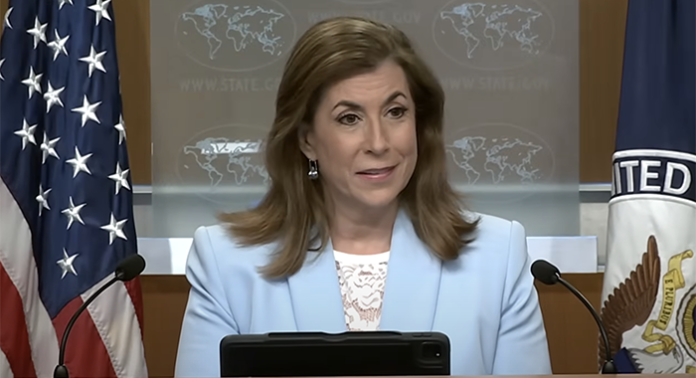
WASHINGTON (CMC) – The United States State Department has confirmed that President Donald Trump is considering imposing a travel ban on 36 countries, including four in the Caribbean.
I can speak a little bit about it, not into the detail of what, about the decision making or the process in that regard, but we are, of course, committed to protecting our nation’s citizens by upholding the highest standards of national security and public safety through our visa process in particular.
State Department spokesperson, Tammy Bruce, said while she could “speak a little bit about it, not into the detail of what – about the decision making or the process in that regard, but we are of course committed to protecting our nation’s citizens by upholding the highest standards of national security and public safety through our visa process in particular.
“As laid out in President Trump’s Executive Order 14161, ‘Protecting the United States from Foreign Terrorists and Other National Security and Public Safety Threats,’ the visa adjudication process has to ensure that U.S.-bound foreign travelers do not pose a threat to the national security and public safety of the United States. That is, I think a very low bar and is a bar that every nation should be able to adopt,” she told the daily press briefing on Tuesday.
Over the weekend, the Washington Post reported that Antigua and Barbuda, Dominica, St Kitts and Nevis, and St. Lucia were listed in a leaked State Department memo signed by Secretary of State Marco Rubio and circulated to US diplomatic missions.
The four Caribbean countries named in the memo have previously defended their citizenship by investment (CBI) programmes as legitimate tools for economic development, with safeguards including rigorous due diligence.
Under the CBI programme, foreign investors are granted citizenship in return for making a substantial investment in the socio-economic development of these countries.
The Caribbean countries have all said they have not received an official communication from Washington regarding the pending travel ban.
Bruce told reporters that to “protect the national security and national interest of the United States and its people, the Department of State and other US government agencies assess other countries’ security capabilities, information sharing, and identity management practices; exploitation of the U.S. visa system such as overstay rates; and failure to facilitate the repatriation of their removable nationals.
“So, noting where a country, perhaps, as you did, is located, the geoposition — actual location – of a country is not a factor, or what continent that country is on,” she said.
“These are about very specific aspects of whether or not the United States feels it can trust the information we rely on those countries for to determine whether or not they’ll get a visa. “… we rely on the vetting and the presentation of information from other nations to say yes, you can or you can’t come.”
She said that in this particular instance, “I think that it’s clear as we’re looking at providing a time, countries being told if they don’t get to that point where we can trust them, then they’ve got to change the system, update it, do whatever they need to do to convince us that we can trust the process and the information they have.
“So that is the goal of this. The Secretary will have the discretion to determine whether or not someone is on that list as we then also continuously vet the nature of what’s happening within these conversations, and the goal is so that we can all move forward, so that people can come to the country, and that’s our goal,” Bruce added.
According to the Washington Post, the memo gives the listed governments 60 days to meet newly defined benchmarks. Governments had been given a deadline of 8 a.m. (local time) on Wednesday to submit an initial action plan outlining how they intend to meet the requirements.
A key concern cited in the memo is the sale of citizenship without a residency requirement. The memo also referenced other issues, such as alleged incidents of “anti-American activity” in the US by nationals of listed countries.
However, the memo also suggests that countries willing to accept third-country nationals removed from the US, or to enter a “safe third country” agreement, could alleviate some of Washington’s concerns.
In addition to the Caribbean nations, the list includes 25 African countries and several from Central Asia and the Pacific.
Bruce said that while Washington has not heard back from any of the countries, “the fact is that they will have a considerable amount of time to rectify whatever the situation is that the State Department is determined is affecting the nature of our trust in how we issue a visa”.

